DecentaSpeak initially attracted Latvian conspiracy theorists and influencers but has so far failed to gain significant user base
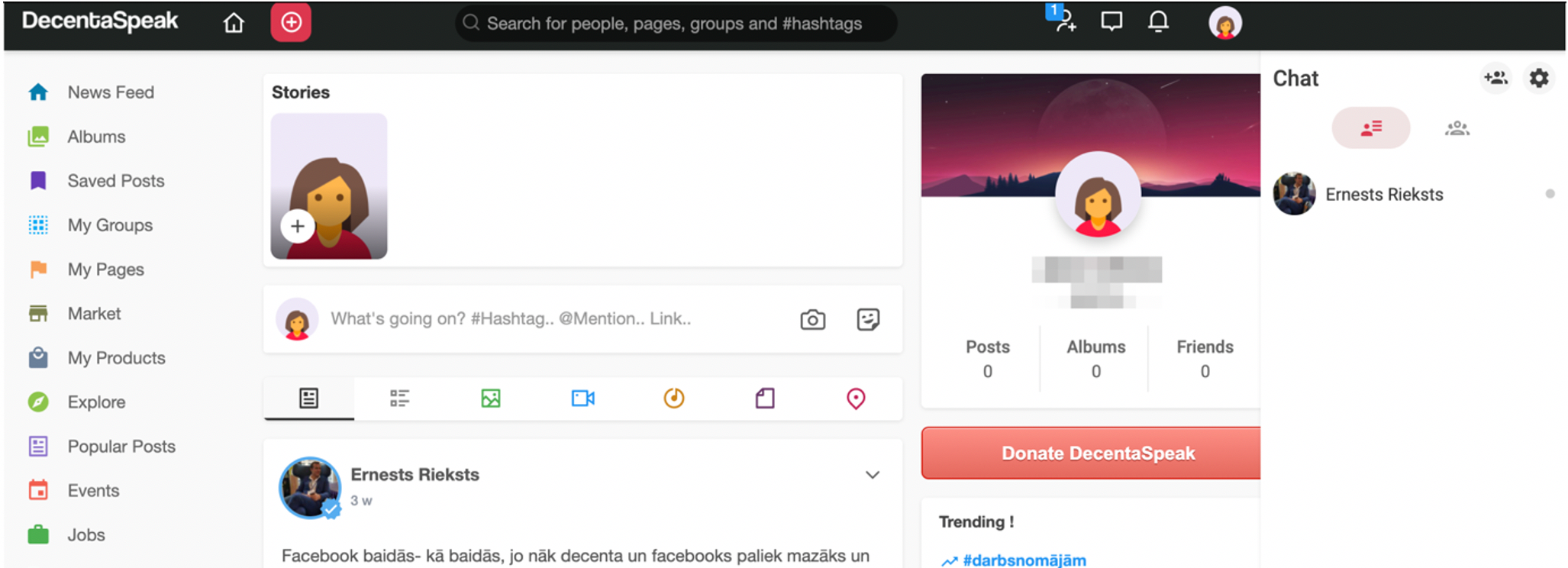
By Nika Aleksejeva
Ernests Rieksts, a COVID-skeptic and controversial Latvian hostel owner, used Facebook to promote an alternative social network he created in response to Facebook’s enforcement actions against conspiracy theorists and extremist influencers. The platform, called DecentaSpeak, is explicitly advertised as a censorship-free alternative to mainstream social networks geared at a COVID-skeptic, anti-establishment, and homophobic audience in Latvia.
DecentaSpeak appears to be the project of Rieksts, an owner of a chain of hostels in Riga who has been accused of tax evasion and mistreatment of his employees. Rieksts became infamous in 2016, when Latvian TV show Bez Tabu did a story about him paying hostel workers in cash or not paying at all. On April 28, 2021, an illegal hostel in Riga burned down, and the fire killed eight people. While he has not been named as a suspect, police are now looking to speak with Rieksts about the incident.
Latvia has had a domestic alternative to Facebook, called Draugiem.lv, since 2004. The DecentaSpeak social network, however, was created in response to Facebook’s more recent attempts to tamp down on the spread of disinformation and online extremism by deplatforming influencers. On January 7, 2021, Facebook suspended the page of Donald Trump, the former president of the United States, in response to several posts he made glorifying his supporters as they stormed the Capitol on January 6,. After being banned from Facebook, Twitter and YouTube, Trump promised to create his own communications platform and came up with a site resembling a blog on May 2021.
Meanwhile, many Trump supporters turned away from mainstream social networks and joined “alt-tech” platforms, like Parler and Gab, that position themselves as censorship-free alternatives and are known for harboring extremist communities due to their lax content moderation standards. The DecentaSpeak website in Latvia appears to be inspired by these recent shifts in the U.S.-based social media landscape that have taken place since January 2021.
The network has thus far failed to gain much traction in Latvia, with only 1,600 users at the time of analysis. Nonetheless, it has been adopted by various opposition activists, COVID-skeptic influencers, and anti-LGBT figures in Latvia who have been subject to fact-checking or account suspensions on Facebook.
The platform
DecentaSpeak works very similarly to Facebook but promises unfettered freedom of speech. The platform provides users with the ability to publish multimedia content in the form of a timeline post or a story, send and receive reactions such as comments and shares, create groups and pages, sell products, promote events, and more.
The platform first appeared in early 2021. Its domain name was registered on January 12 and its Privacy Policy was last updated on January 28. The first user joined on February 10, according to a post by the platform’s own account.

To date, DecentaSpeak remains a very small social network, with only 1,618 users, 13 pages and 16 groups in total at the time of analysis. Most of the users have Latvian names. The subjects discussed in the groups and on pages were quite neutral — most were dedicated to lifestyle, entertainment, and commerce. The most popular group was for selling, buying, and exchanging goods. It had 110 members, but no posts.
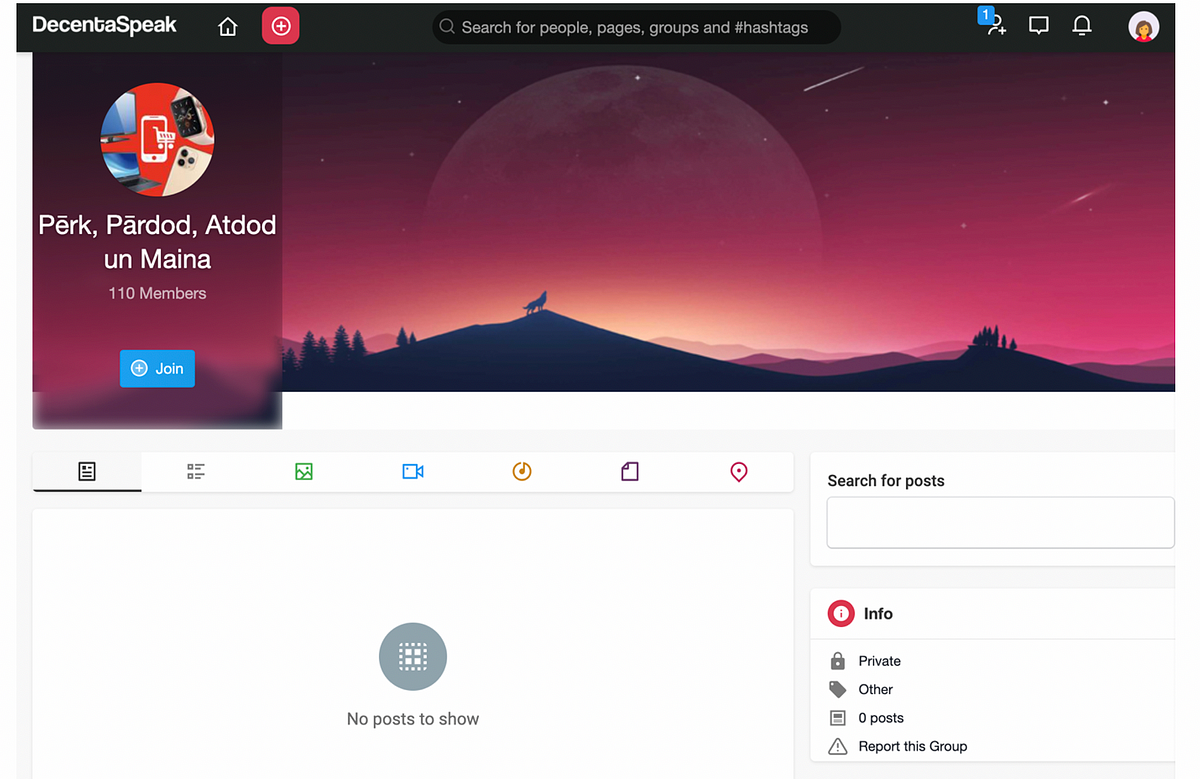
Attracting disinformation influencers from Facebook
While very small, the platform has attracted certain influencers and political activists who post content that sow distrust in the ruling government in Latvia and promote vaccine hesitancy.
For example, the anti-vaccine Facebook page Vakcinrealitate Latvija recently established a corresponding presence on DecentaSpeak and reposted a video of a conversation about the supposed danger of COVID-19 vaccines. Previously, Vakcinrealitate distributed brochures with false and exaggerated claims regarding COVID-19 vaccine safety.
Another noteworthy Facebook user that recently created a DecentaSpeak account is Valentins Jeremejevs, a local activist with a long track record of organizing anti-establishment demonstrations in Latvia. Most notably, in December 2020 Latvian police detained him for spreading false allegations about the COVID-19 pandemic being a scam and claiming that Latvian hospitals had no COVID-19 patients.
Aldis Gobzems, a popular opposition politician with large following on Facebook, also created a DecentaSpeak account and shared a video in which he addressed Latvian President Egils Levits, calling for him to lay off the ruling government.
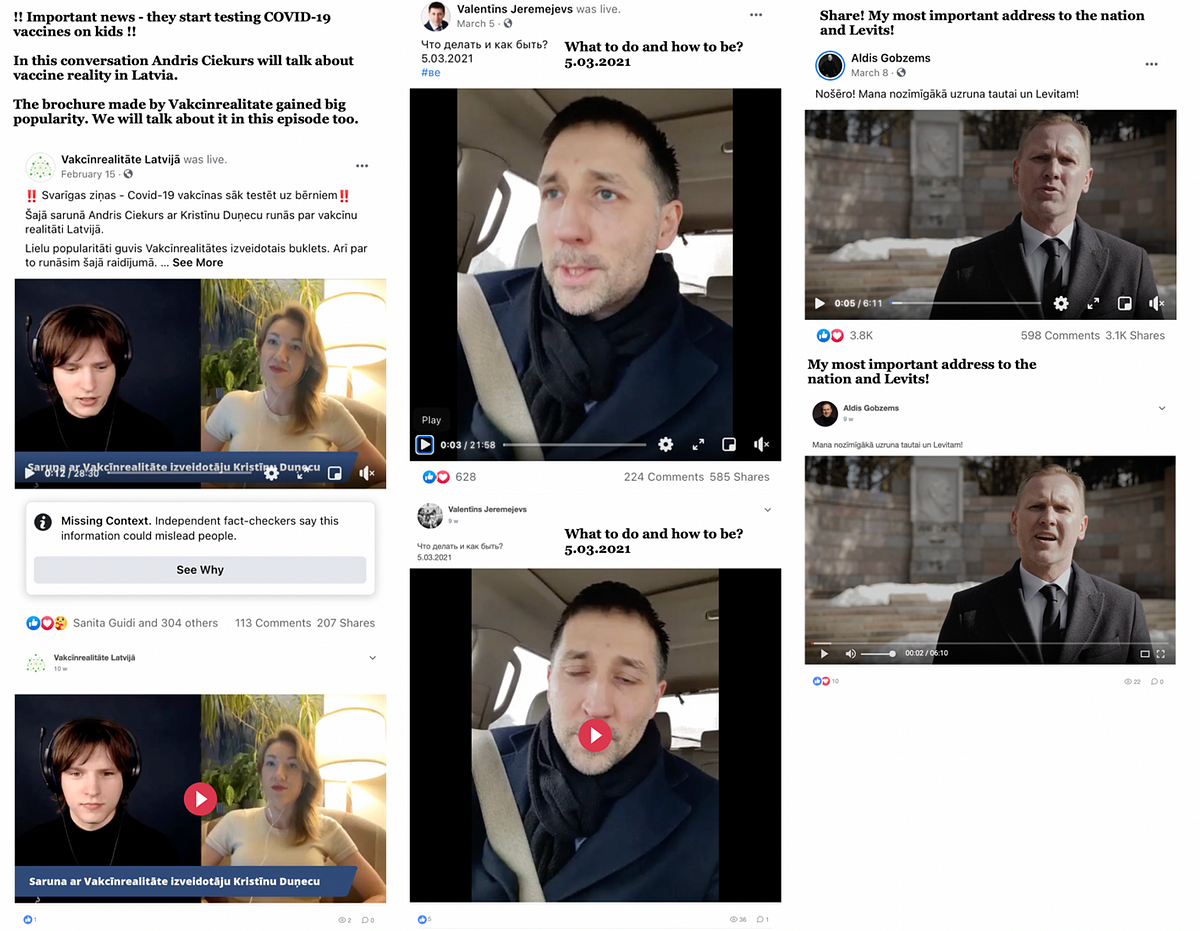
The new platform attracted other well-known influencers in Latvia who regularly spread disinformation, including Niks Endzins, who has been detained several times for spreading false news online; Janis Plavins, a businessman who sells a fraudulent health product called “Memory Water” and publishes false news about COVID-19, 5G and other popular conspiracy theory topics; and the medical clinic Agenskalna Klinika, which used to offer “spiritism” appointments, but has lately spread falsehoods about the COVID-19 pandemic.
Connection to Rieksts
The aforementioned Facebook accounts joined DecentaSpeak in response to Facebook’s recent content moderation actions of blocking, suspending, and limiting the reach of accounts that spread disinformation flagged by third-party fact-checkers. This was the reason that Andris Kivics, a controversial Latvian musician with homophobic views, cited when he switched to DecentaSpeak.
On February 23, 2021, he was blocked from Facebook, according to a post by his wife, for a post in which he expressed direct hate toward gay people in Latvia. The post is down, but other Facebook users preserved screenshots of Kivics’ post.
Kivics has a talk show on YouTube called No Bullshit Experience. It is sponsored by Riga Float spa, which Ernests Rieksts admitted to owning during an episode, tying together the two men.
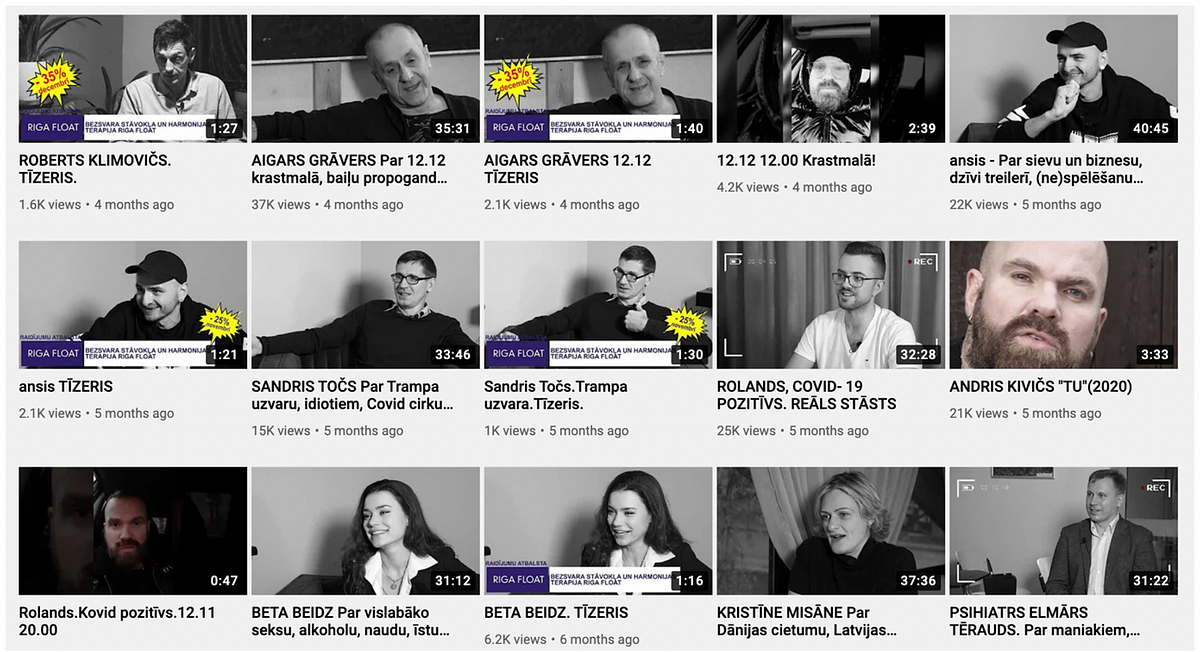
There are multiple posts on DecentaSpeak and Facebook that suggest that Ernests Rieksts is the person in charge of the alternative social network. On March 26, Ernests Rieksts announced on his Facebook profile that he created DecentaSpeak for those “who are being censored by Facebook.” On May 7, a DecentaSpeak account impersonating Donald Trump congratulated Rieksts with creating the platform. Additionally, Rieksts replied to a DecentaSpeak account that complained about the functionality of the platform by assuring that he will “fix everything.”
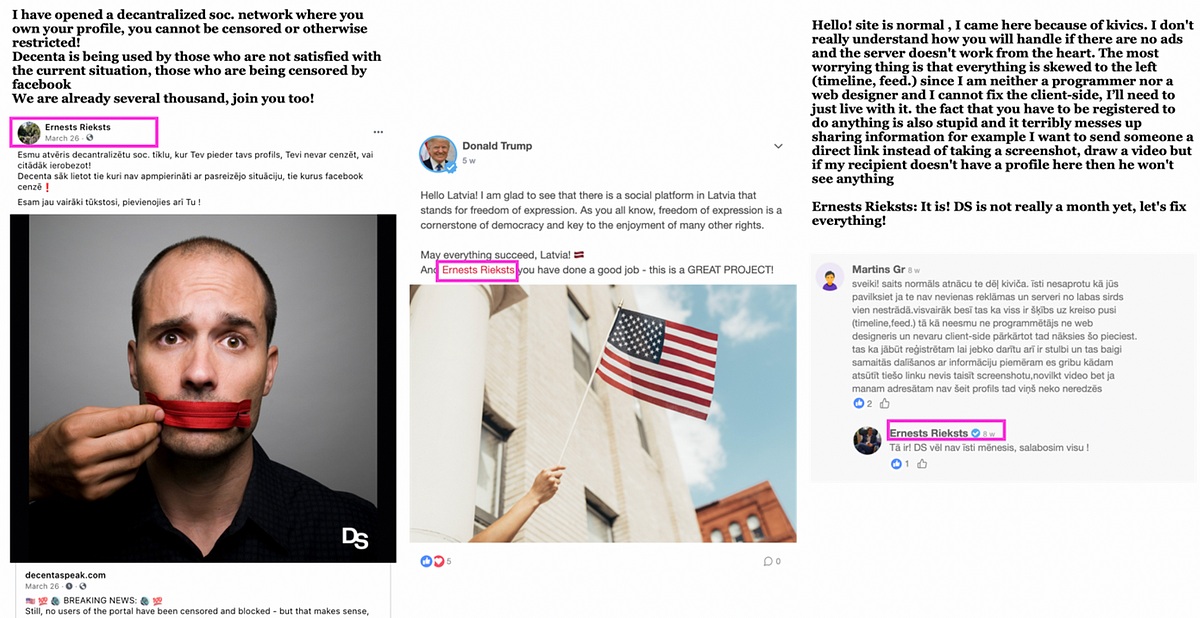
Name changes on Facebook
There is a DecentaSpeak Facebook page with 18,600 followers and a Facebook group with 56,100 members. These audiences would be significant if the page and the group had been created at the time the platform first appeared. The page, however, has existed since December 2016, initially starting out by posting memes. It changed its focus to cryptocurrency in 2018; promoted Riga Float Spa in 2020; and finally, changed its name to DecentaSpeak on February 22, 2021. The group has existed since 2015 and has experienced multiple name changes. Initially it was dedicated to job advertisements, then psychological health and medical help; finally, it changed its name to DecentaSpeak on February 25, 2021.
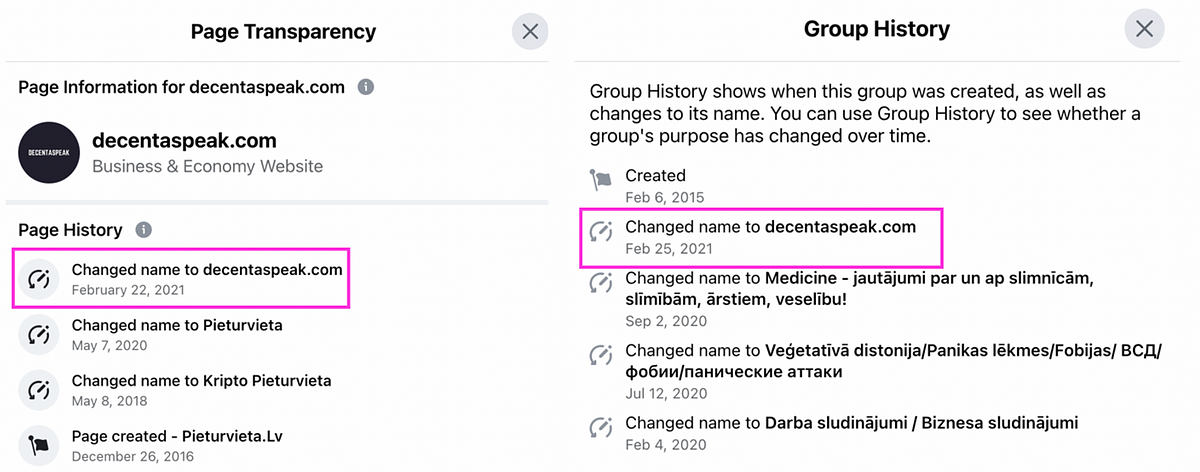
These multiple name changes allowed both the Facebook page and group to develop a multipurpose audience. However, according to Facebook analysis tool CrowdTangle, which started tracking the page in its database in May 2019, the follower count has actually declined over the past few months.
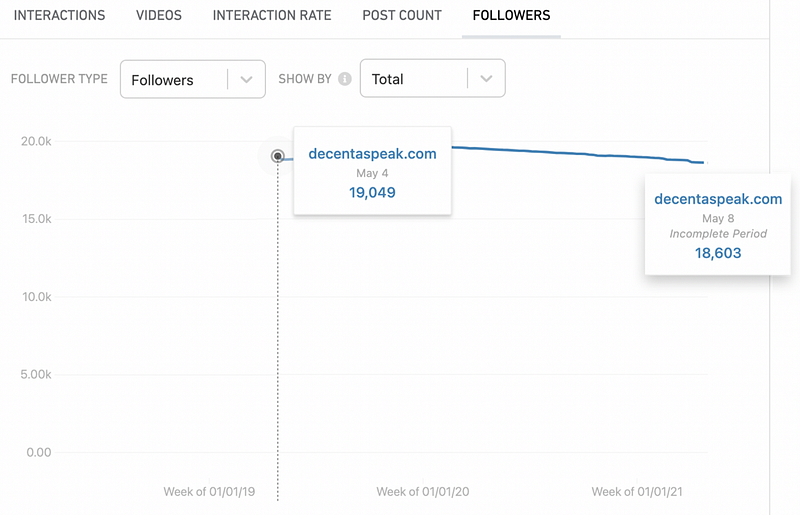
Despite efforts to position DecentaSpeak as a “censorship-free” alternative to Facebook in Latvia and its adoption by several Latvian conspiracy theorists and influencers, the platform has thus far failed to attract a critical mass of users.
Nika Aleksejeva is a Research Associate, Baltics, with the Digital Forensic Research Lab.
Cite this case study:
Nika Aleksejeva, “Anti-vaxx Latvian businessman creates alt-tech platform for users banned from Facebook,” Digital Forensic Research Lab (DFRLab), May 13, 2021, https://medium.com/dfrlab/anti-vaxx-latvian-businessman-creates-alt-tech-platform-for-users-banned-from-facebook-94bf5c45b840.
Follow along for more in-depth analysis from our #DigitalSherlocks.

